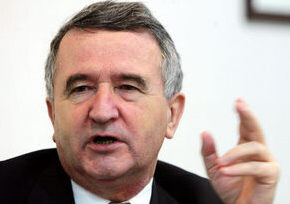hankyoreh
Links to other country sites 다른 나라 사이트 링크
Korea, Poland remember their troubled histories

In 2004, a special committee was established to uncover the truth regarding those that sided with the Japanese government during South Korea’s 1910-1945 colonial rule. On November 16, the committee held an international academic conference in Seoul. A Polish professor traveled to Korea to attend, for his country has not only a similar history, but also comparable measures in place to seek the truth about the past.
On November 17, The Hankyoreh met Leon Kieres, 58, a professor at Wroclaw University in Poland.
"This is my first visit to South Korea, but I feel like I’m already familiar with it. On the streets of Wroclaw, it’s easy to meet Koreans," he said. Professor Kieres was a member of the Solidarity Union, led by Lech Walesa, and was the first president of the Institute of National Remembrance (INB), started under a 1998 law.
The institute allows victims and their families to read documents classified during the 1944-1989 Communist period, while educating people about crimes committed by both the Nazis and the Soviets. In addition, the institute tracks down criminals and brings them to trial. Currently, the institute is investigating 77 crimes committed by the Nazis and about 300 crimes during Soviet rule. The number is much higher for those crimes during the Soviet era because following the second World War, Poland punished about 6,000 war criminals, with 200 sentenced to death.
The objective of the institute is not to punish criminals, but to seek the truth, Kieres said. "What’s more important is to find out what happened during periods of brutal oppression and to not let history repeat itself."
The institute, affiliated with the Polish parliament, has about 1,400 full-time workers, and operates on an annual budget of US$50 million. The institute’s president has immunity for the duration of his tenure.
South Korea’s committee to investigate pro-Japanese activities and crimes during colonial rule comes up short compared to these figures. In addition, the South Korean committee is a temporary body, with only a four-year contract.
South Korea and Poland both faced outside invaders who established governments on their land. But the countries’ histories fall on opposite ends of the ideological spectrum. The Soviets represented a communist revolution, or one of the far left, whereas Japanese collaborators during the colonial period were generally on the right politically.
Kieres said citizens supported the institute from the start, but left-leaning politicians opposed it, citing its ’uncertain outlook toward the future of the country.’ This contrasts with the situation in South Korea, where the right opposed the investigation of the past. However, a national consensus has grown, enough to keep the institute in place, Kieres said.
"After World War II, Poland also questioned nationals who took vigilante justice against Germans remaining in Poland," Kieres said. They were told, "Remember history: the truth is very painful, but it should be accepted."
Currently, Poland has friendly ties with Germany, which has apologized for its past wrongdoings, but relations with Russia are still chilly. Moscow recently admitted to a massacre of about 22,000 Poles during its occupation.
Editorial・opinion
![[Guest essay] Preventing Korean Peninsula from becoming front line of new cold war [Guest essay] Preventing Korean Peninsula from becoming front line of new cold war](https://flexible.img.hani.co.kr/flexible/normal/500/300/imgdb/original/2024/0507/7217150679227807.jpg) [Guest essay] Preventing Korean Peninsula from becoming front line of new cold war
[Guest essay] Preventing Korean Peninsula from becoming front line of new cold war![[Column] The state is back — but is it in business? [Column] The state is back — but is it in business?](https://flexible.img.hani.co.kr/flexible/normal/500/300/imgdb/original/2024/0506/8217149564092725.jpg) [Column] The state is back — but is it in business?
[Column] The state is back — but is it in business?- [Column] Life on our Trisolaris
- [Editorial] Penalties for airing allegations against Korea’s first lady endanger free press
- [Editorial] Yoon must halt procurement of SM-3 interceptor missiles
- [Guest essay] Maybe Korea’s rapid population decline is an opportunity, not a crisis
- [Column] Can Yoon steer diplomacy with Russia, China back on track?
- [Column] Season 2 of special prosecutor probe may be coming to Korea soon
- [Column] Park Geun-hye déjà vu in Yoon Suk-yeol
- [Editorial] New weight of N. Korea’s nuclear threats makes dialogue all the more urgent
Most viewed articles
- 1Yoon’s broken-compass diplomacy is steering Korea into serving US, Japanese interests
- 2[Guest essay] Preventing Korean Peninsula from becoming front line of new cold war
- 3South Korean ambassador attends Putin’s inauguration as US and others boycott
- 4Yoon’s revival of civil affairs senior secretary criticized as shield against judicial scrutiny
- 5Behind-the-times gender change regulations leave trans Koreans in the lurch
- 6Family that exposed military cover-up of loved one’s death reflect on Marine’s death
- 7Japan says its directives were aimed at increasing Line’s security, not pushing Naver buyout
- 8Amid US-China clash, Korea must remember its failures in the 19th century, advises scholar
- 9Lee Jung-jae of “Squid Game” named on A100 list of most influential Asian Pacific leaders
- 10S. Korean first lady likely to face questioning by prosecutors over Dior handbag scandal